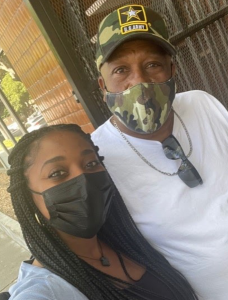 The Sacramento Continuum of Care’s Racial Equity Committee is working to create an equitable, accountable, and transparent homelessness system that catalyzes structural change both inside and outside of our current sphere of influence. This committee – comprised primarily of Black, Indigenous and Other People of Color – is tasked with creating a racial equity action plan that will guide the decision making of the CoC.
The Sacramento Continuum of Care’s Racial Equity Committee is working to create an equitable, accountable, and transparent homelessness system that catalyzes structural change both inside and outside of our current sphere of influence. This committee – comprised primarily of Black, Indigenous and Other People of Color – is tasked with creating a racial equity action plan that will guide the decision making of the CoC.
Angela Upshaw is the co-chair of the Racial Equity Committee (REQC). She’s used her expertise in homeless services to inform her work interviewing Black, Indigenous and Other People of Color (BIPOC) to learn about their experiences with homelessness and working with the community to build a racial equity action plan.
Upshaw is the Associate Director of Programs at Berkeley Food & Housing Project where she oversees several housing programs across the six Northern California counties. Upshaw is a voting Board Member for the Sacramento Continuum of Care (CoC) and the non-profit agency, East Bay Housing Organizations. She holds two Master’s Degrees, one in Public Health and the other in Business Administration.
Sacramento Steps Forward (SSF) explored her motivation for serving on this committee and her hopes for how this work will impact the community.
What motivated you to join the REQC?
My motivation to join and co-chair the Racial Equity Committee stemmed from my interest in identifying and exploring solutions to eliminate race as a predictor for homelessness and change particular policies and practices to make them antiracist. As a black woman with lived experience of homelessness, I can share personal insight and connectivity to this cause. As a public health professional and senior leader in homeless services, I can speak to racism and racial inequities in the workplace and their effect on health (physical, social, and mental). Finally, as a Board member of the Sacramento CoC and East Bay Housing Organization (EBHO), I understand the importance of policy and community engagement surrounding race and homelessness.
What have you learned in your role on the committee?
We have a wealth of knowledge and experience within our committee and those who attend our meetings. So far, I’ve had the opportunity to learn about some of the work to address race and homelessness in Sacramento through our first REQC Stakeholder Forum. Through interviews and listening sessions, I gleaned valuable information from the experiences of members of the BIPOC community and their understanding of navigating the homeless services in Sacramento County. In addition, we’ve had a series of Racial Equity training that have helped open my eyes to my own biases and reinforced my knowledge of segregation’s legacies and how it has contributed to the racial wealth gap.
What are some of your hopes for what will come out of the committees’ work?
One of the outcomes of this committee is to create an action plan for the CoC Board that will address potential solutions and next steps to ensure non-discrimination in our homelessness services system. I hope that the REQC will help the CoC Board promote racial equity and explore ways to expand funding to underserved communities and non-traditional providers. I realize this work is ongoing and will need to be embedded in decision-making moving forward. We will need to begin looking at our work, whether it be funding opportunities or program implementation, through a race equity lens to ensure our actions don’t create more harm or unintended disparities.

